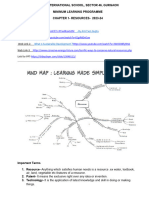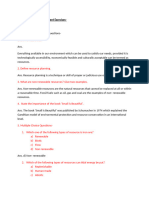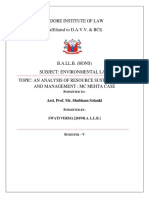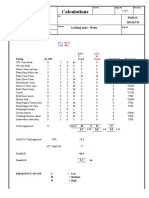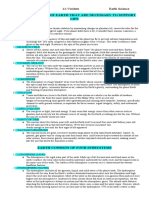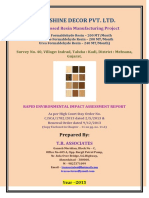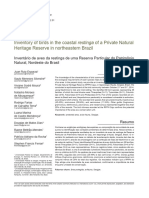Std. VIII Ch.1 Resources Notes (22-23)
Std. VIII Ch.1 Resources Notes (22-23)
Uploaded by
Prachi PurswaniCopyright:
Available Formats
Std. VIII Ch.1 Resources Notes (22-23)
Std. VIII Ch.1 Resources Notes (22-23)
Uploaded by
Prachi PurswaniCopyright
Available Formats
Share this document
Did you find this document useful?
Is this content inappropriate?
Copyright:
Available Formats
Std. VIII Ch.1 Resources Notes (22-23)
Std. VIII Ch.1 Resources Notes (22-23)
Uploaded by
Prachi PurswaniCopyright:
Available Formats
UDGAM SCHOOL FOR CHILDREN
Std. VIII – Social Science (2022-23)
Ch.1: Resources Notes
Name: _________________________ Std. / Sec.: ________ Roll No.: _____ Date: ________
Q1. Why are resources distributed unequally over the earth?
A1. The resources are distributed unequally over the earth because of the following reasons:
a. The diverse physical factors like topography, climatic conditions, temperature, and altitude
vary from place to place and time to time on the earth.
b. Besides, economic potential due to new technological breakthroughs and recent advances in
the level of development also determine the distribution of resources on the earth which is not
the same everywhere.
Q2. What do you mean by value addition? Elaborate the type of values associated with the
resources.
A2. Value means worth. The utility and usability of a resource varies from time to time and place
to place, thus giving the resource its value. Time and technology are the two factors that
change the value of substances and make them resources.
The resources in the raw form are changed into more useful types known as value addition.
Four types of values are associated with the resources. They are:
a. Economic value - The resources which can command a good price (monetary gain) earn
economic value. Raw materials like cotton, machines for production and services like banking
etc. have economic value.
b. Aesthetic value – The scenic beauty of natural resources like mountains, sunset, waterfall,
any object, or an event earns aesthetic value as it possesses the virtue of its capacity to elicit
pleasure when appreciated.
c. Legal value - The various Acts and regulations formulated by the government to safeguard
country’s resources gives legal value to these resources. For e.g.: Wildlife Protection Act of
1972, Air (Prevention and Control of Pollution) Act 1981, Environment Protection Act 1986
etc.
d. Ethical value - It refers to the moral values in action as it protects life and is respectful of
others. For e.g.: The responsibility to protect National Parks and Sanctuaries, to keep beaches
clean, to save rivers from pollution, to stop misuse of resources, refers to the ethical value of
the resource.
Q3. Why is the demand for using resources increasing globally?
A3. The demand for using resources is increasing globally at an alarming rate. This is due to
the following factors listed below:
a. High and rapid population growth causes a pressing demand on the limited natural
resources.
b. Global use of resources have increased ten folds and has intensified economic competition
between countries.
Std. VIII / SS / Geo. Ch. 1 / Notes / 2022-23 Page 1 of 2
anupama@udgamschool.com / renu.singh@udgamschool.com / koyel.sengupta@udgamschool.com
c. Increasing wealth and power, especially in economically developed countries have paved
way for the growth of more advanced technologies.
d. Emerging innovative technologies have opened opportunities for the countries to unearth
rare resources, find out new ways to use them and exploit the existing ones.
The above factors eventually have created demand for more and more resources.
Q4. ‘The human resources provide the base for the development of any country’. Justify
the statement.
Human resources provide an important base for the development of any country because of
the following reasons:
a. They refer to the quality and the quantity of the people. The skill of humans help in
transforming the physical materials into valuable resources.
b. They are exceptionally valuable as higher productivity of human resources produce more
productive goods and services which finally leads to the development of the country.
c. Healthy mind, sound body, education and training of human resources is directly proportional
to the development of any country.
Q5. Make a mind map of the content learnt in the chapter.
Q6. What is meant by Sustainable Development? What are the principles of Sustainable
Development?
Sustainable Development can be defined as ‘development that meets the needs of the
present without compromising the ability of the future generations to meet their own needs’.
The principles of Sustainable Development are the following:
a. Respect and care for all forms of life.
b. Improve the quality of human life.
c. Conserve the earth’s vitality and diversity.
d. Minimise the depletion of natural resources.
e. Change personal attitude and practices towards the environment.
f. Enable communities to care for their own environment.
Std. VIII / SS / Geo. Ch. 1 / Notes / 2022-23 Page 2 of 2
anupama@udgamschool.com / renu.singh@udgamschool.com / koyel.sengupta@udgamschool.com
You might also like
- Veiled Fate Lore BookDocument65 pagesVeiled Fate Lore BookDrew TschetterNo ratings yet
- MLP Chap 1 Resources 2023 24Document5 pagesMLP Chap 1 Resources 2023 24dodo nanaNo ratings yet
- bulletins-vhnZeeH3J-Std. X Ch.1 Resources & Development Notes (23-24)Document6 pagesbulletins-vhnZeeH3J-Std. X Ch.1 Resources & Development Notes (23-24)T.S GoriNo ratings yet
- (Notes) Resources and DevelopmentDocument10 pages(Notes) Resources and Developmentsss pppNo ratings yet
- Class 8-Ch-1 - Resources PDFDocument4 pagesClass 8-Ch-1 - Resources PDFSaghana SaravanakarthikNo ratings yet
- Notes On Resource and Development STD-10 (2024)Document11 pagesNotes On Resource and Development STD-10 (2024)chaitanyabharate1No ratings yet
- Resource and Development ExercisesDocument18 pagesResource and Development Exercisesshahidaiqubal786No ratings yet
- Resources and DevelopmentDocument14 pagesResources and Developmentzainab.queen421No ratings yet
- AS - WB - CB - VIII - SSC RecDocument5 pagesAS - WB - CB - VIII - SSC Recaaravraghatate31No ratings yet
- Asm 18652Document3 pagesAsm 18652dishadagar11No ratings yet
- SST CH 1 Geography ResourcesDocument2 pagesSST CH 1 Geography ResourcesA GUPTANo ratings yet
- gr.8 ResourcesDocument4 pagesgr.8 Resourcesbnzc8dx2qfNo ratings yet
- Geo Chap 1 Q&aDocument24 pagesGeo Chap 1 Q&aCranston VideoNo ratings yet
- Resources and DevelopmentDocument11 pagesResources and DevelopmentSoniaNo ratings yet
- Geography Class XDocument46 pagesGeography Class Xbhupenderrana78% (32)
- Social Science Class 10 Important Questions Geography Chapter 1 Resources and DevelopmentDocument17 pagesSocial Science Class 10 Important Questions Geography Chapter 1 Resources and DevelopmentRITESH KUMAR SAHUNo ratings yet
- SST Q&a X GeoDocument109 pagesSST Q&a X Geobabitakashyapdnk7No ratings yet
- Question 1Document19 pagesQuestion 1ashok pradhanNo ratings yet
- Class 8 Geography NCERT Solution Chapter 1 ResourcesDocument37 pagesClass 8 Geography NCERT Solution Chapter 1 ResourcesArtham ResourcesNo ratings yet
- PWS 3 Resources & DevelopmentDocument9 pagesPWS 3 Resources & Developmentkeerthichalla22No ratings yet
- Resource & Developement - SubjectiveDocument17 pagesResource & Developement - SubjectiveSoorya PNo ratings yet
- Geography 21-22 Class 10 Synopsis and Assignment Part 1Document4 pagesGeography 21-22 Class 10 Synopsis and Assignment Part 1Aquib IrshadNo ratings yet
- Chapter 1 Resources and Development Part B Question and AnswersDocument9 pagesChapter 1 Resources and Development Part B Question and Answersaloma.alvaresNo ratings yet
- Ch1 GeoDocument2 pagesCh1 GeoLakshNo ratings yet
- 2023 2024 Class VIII Social Studies Part 1 AWDocument7 pages2023 2024 Class VIII Social Studies Part 1 AWBRO IT’S DHARAHASNo ratings yet
- Short Answer Questions - Resources and Development - Social Studies (SST) Class 10 PDF DownloadDocument6 pagesShort Answer Questions - Resources and Development - Social Studies (SST) Class 10 PDF Downloadbatsmen2007No ratings yet
- 270424110406File8TH GEOGRAPHY FA-1Document4 pages270424110406File8TH GEOGRAPHY FA-1famkmr11No ratings yet
- Chapter 1 - Resources and Development: Multiple Choice QuestionsDocument17 pagesChapter 1 - Resources and Development: Multiple Choice QuestionsreemNo ratings yet
- Resources and Development AssignmentDocument6 pagesResources and Development AssignmentBhavya AhujaNo ratings yet
- CH 1 GeoDocument26 pagesCH 1 Geopranavsugan31No ratings yet
- DocumentDocument16 pagesDocumentMadhavi PatelNo ratings yet
- Geography Chapter 1 Resources and DevelopmentDocument27 pagesGeography Chapter 1 Resources and Developmentmanitchaudhary8224No ratings yet
- Wa0023.Document18 pagesWa0023.ayushtandi486No ratings yet
- HGC Chapter 1 GeoDocument23 pagesHGC Chapter 1 GeosreyashsharmasbpNo ratings yet
- UntitledDocument4 pagesUntitledDev voraNo ratings yet
- Resources and Development (Class 10)Document8 pagesResources and Development (Class 10)sunidhij292No ratings yet
- Geo PDFDocument21 pagesGeo PDFSoviya Varatharajan08No ratings yet
- 10 Socialscie Development 01Document4 pages10 Socialscie Development 01vifaxe3618No ratings yet
- Class X - Resources and DevelopmentDocument8 pagesClass X - Resources and DevelopmentAryavir SardanaNo ratings yet
- GeographyDocument7 pagesGeographyraunakdeepaksinghNo ratings yet
- Geo - NcertDocument98 pagesGeo - NcertMegan CruzNo ratings yet
- Resources Q & AnsDocument4 pagesResources Q & AnsARYAN BGNo ratings yet
- Resources and DevelopmentDocument16 pagesResources and Developmentfuture9100No ratings yet
- Resources and Development (Pg 1-4)Document6 pagesResources and Development (Pg 1-4)Anisa GuptaNo ratings yet
- Day 2 L1 ResourcesDocument15 pagesDay 2 L1 ResourcesShomali RamNo ratings yet
- Geo-10 2Document107 pagesGeo-10 2SonalikaNo ratings yet
- Class 8 ResourcesDocument2 pagesClass 8 ResourcesRAMAKRISHNANo ratings yet
- Our Resources. NotesDocument4 pagesOur Resources. NotesYrryr TryyeyrrNo ratings yet
- Resources Class 8 Notes CBSE Geography Chapter 1 PDFDocument3 pagesResources Class 8 Notes CBSE Geography Chapter 1 PDFrohitkumariitjam55No ratings yet
- ES Module 4Document16 pagesES Module 4f17akemeNo ratings yet
- X - Financial Management - Employability Skills - Unit 5 Green SkillsDocument2 pagesX - Financial Management - Employability Skills - Unit 5 Green Skillsrenudevi198725No ratings yet
- Ndore Nstitute of Law (Affiliated To D.A.V.V. & BCI) : Asst. Prof. Mr. Shubham SolankiDocument18 pagesNdore Nstitute of Law (Affiliated To D.A.V.V. & BCI) : Asst. Prof. Mr. Shubham SolankiSwatiVermaNo ratings yet
- Jess 101Document13 pagesJess 101Shreya Sharma100% (1)
- Resources and DevelopmentDocument10 pagesResources and Developmentspecialiam541No ratings yet
- Evs Lecture 4Document2 pagesEvs Lecture 4hridai madhukarNo ratings yet
- Q N A Geog. CL - Viii CH - 1 ResourcesDocument8 pagesQ N A Geog. CL - Viii CH - 1 Resourcesnewzcyclone508No ratings yet
- Summary of Class VIII & X GeographyDocument12 pagesSummary of Class VIII & X GeographyManoj KumarNo ratings yet
- VeryDocument4 pagesVerya.rithish009No ratings yet
- Stewardship of the Built Environment: Sustainability, Preservation, and ReuseFrom EverandStewardship of the Built Environment: Sustainability, Preservation, and ReuseNo ratings yet
- Becoming a Green Building Professional: A Guide to Careers in Sustainable Architecture, Design, Engineering, Development, and OperationsFrom EverandBecoming a Green Building Professional: A Guide to Careers in Sustainable Architecture, Design, Engineering, Development, and OperationsNo ratings yet
- The Worth of Water: Designing Climate Resilient Rainwater Harvesting SystemsFrom EverandThe Worth of Water: Designing Climate Resilient Rainwater Harvesting SystemsNo ratings yet
- STD - 8 Math Activity - Ch-12 Exponents and Powers (Activity-2)Document1 pageSTD - 8 Math Activity - Ch-12 Exponents and Powers (Activity-2)Prachi PurswaniNo ratings yet
- Grade 8 - Math Lab - Activity 2 - Ch.12Document1 pageGrade 8 - Math Lab - Activity 2 - Ch.12Prachi PurswaniNo ratings yet
- Udgam School For Children: Std. VIII English Literature 2022-2023 L 2 The Tsunami (Notes)Document3 pagesUdgam School For Children: Std. VIII English Literature 2022-2023 L 2 The Tsunami (Notes)Prachi PurswaniNo ratings yet
- 2021-2022 VII G 2012084 202203250726172171Document2 pages2021-2022 VII G 2012084 202203250726172171Prachi PurswaniNo ratings yet
- VYDRO LIVINGWALLS - Substrate - 0Document2 pagesVYDRO LIVINGWALLS - Substrate - 0c.saibal9757No ratings yet
- Guya 1Document19 pagesGuya 1Elsie ElimNo ratings yet
- The Noor School: Syllabus Breakup of Pakistan Studies Session 2020-2021 Class VIIICDocument8 pagesThe Noor School: Syllabus Breakup of Pakistan Studies Session 2020-2021 Class VIIICThe Noor SchoolNo ratings yet
- Possibility and Challenge of Smart Community in Japan: SciencedirectDocument10 pagesPossibility and Challenge of Smart Community in Japan: Sciencedirect최두영No ratings yet
- Notes BST - CH 1Document5 pagesNotes BST - CH 1Khushi KashyapNo ratings yet
- VENSYS ET IntroductionDocument16 pagesVENSYS ET IntroductionAgung Kus SugihartoNo ratings yet
- Registered WH ListDocument129 pagesRegistered WH ListGIRISH JOSHINo ratings yet
- Fourth Meeting of The Parties: Convention On Environmental Impact Assessment in A Transboundary ContextDocument26 pagesFourth Meeting of The Parties: Convention On Environmental Impact Assessment in A Transboundary ContextKk king vishwakarmaNo ratings yet
- 00 BLANK - Hot and Cold Water LU Calculation SheetDocument14 pages00 BLANK - Hot and Cold Water LU Calculation SheetAmeet GupteNo ratings yet
- Partnering Life Sciences Development: General CatalogueDocument13 pagesPartnering Life Sciences Development: General CatalogueEslam HassanNo ratings yet
- Navigating Urban Design in The Philippines:: A Study of Pertinent Laws and RegulationsDocument17 pagesNavigating Urban Design in The Philippines:: A Study of Pertinent Laws and RegulationsFerdinand SagcalNo ratings yet
- Lec-14, Ch-9, Importance of MaintenanceDocument34 pagesLec-14, Ch-9, Importance of MaintenanceAmul ShresthaNo ratings yet
- KatniDocument1 pageKatniRUPNIT PHOTOGRAPHYNo ratings yet
- Challenges On The Further Development of Anaerobic Digestion in Developing Countries - A Systematic ReviewDocument1 pageChallenges On The Further Development of Anaerobic Digestion in Developing Countries - A Systematic ReviewGuilherme SchmitzNo ratings yet
- KPCL Assessment StudyDocument9 pagesKPCL Assessment Studykselvan_1No ratings yet
- Characteristics of Earth That Are Necessary To Support LifeDocument2 pagesCharacteristics of Earth That Are Necessary To Support LifeAndrei Sy JaviertoNo ratings yet
- XXXXXXXXXXXXXXXXX XXXXXXXXXXXXXXXXXX: Senior Senior SeniorDocument1 pageXXXXXXXXXXXXXXXXX XXXXXXXXXXXXXXXXXX: Senior Senior SeniorfedNo ratings yet
- Citarum Harum Project: A Restoration Model of River Basin: December 2019Document16 pagesCitarum Harum Project: A Restoration Model of River Basin: December 2019Rofa DzulfikriNo ratings yet
- Thalassa PLM - NSYPLM86GDocument2 pagesThalassa PLM - NSYPLM86GSorina CorpaciNo ratings yet
- Unit 8 Planning Teaching-Learning Activities: StructureDocument28 pagesUnit 8 Planning Teaching-Learning Activities: StructureSan PophaleNo ratings yet
- Case Study (Suhana CNR)Document9 pagesCase Study (Suhana CNR)ajithkumarbme2025No ratings yet
- Ever Shine Decor PVT LTD MH33 Eia1 PDFDocument69 pagesEver Shine Decor PVT LTD MH33 Eia1 PDFNitin PatelNo ratings yet
- Velammal Vidyalaya, Viraganoor STD: X Full Portion Test Max - Marks:80 Subject: BIOLOGY Timing: 3hrs General InstructionsDocument3 pagesVelammal Vidyalaya, Viraganoor STD: X Full Portion Test Max - Marks:80 Subject: BIOLOGY Timing: 3hrs General InstructionsshanthaNo ratings yet
- Group 4 - Engineering Utilities 2Document17 pagesGroup 4 - Engineering Utilities 2John Lloyd Balla100% (1)
- EIA PresentationDocument138 pagesEIA PresentationEzra TivakudzeNo ratings yet
- Strategic Analysis - Harley DavidsonDocument12 pagesStrategic Analysis - Harley DavidsonSimran PoptaniNo ratings yet
- Inventory of Birds in The Coastal RestingaDocument11 pagesInventory of Birds in The Coastal RestingaGustavo QuintanilhaNo ratings yet
- Task - Moh. RafiqDocument14 pagesTask - Moh. RafiqRafiq LaodeNo ratings yet
- Afrinet Carbon Ltd-Pitch DeckDocument18 pagesAfrinet Carbon Ltd-Pitch DeckEdgar MuiruriNo ratings yet

